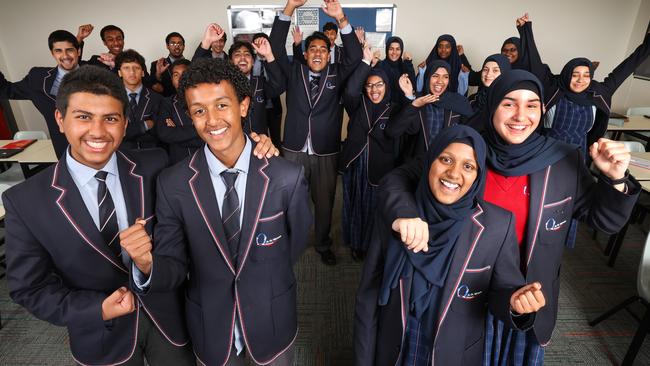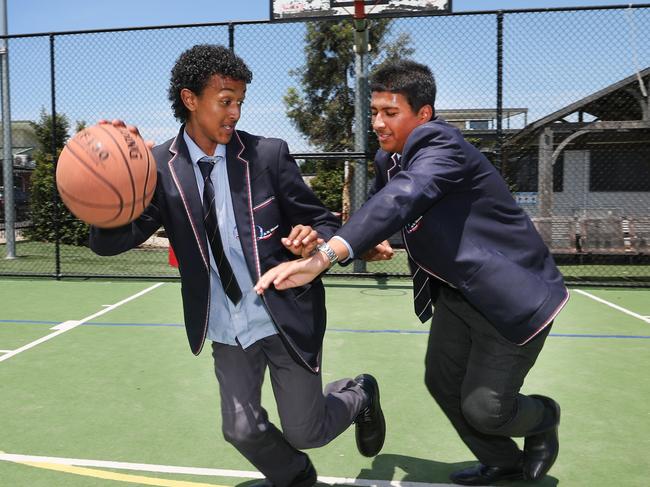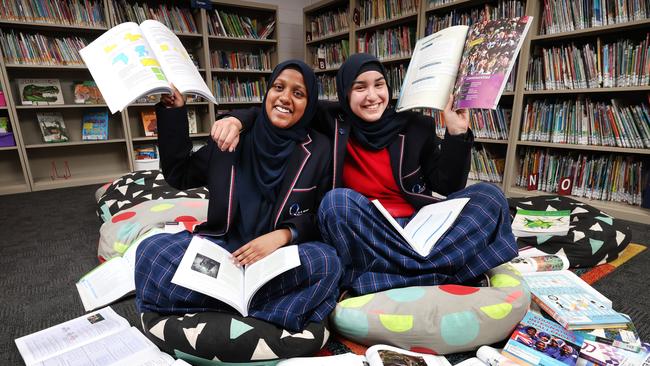Why Victorian teens aren’t as smart as they were 20 years ago
Mobile phones in class, lockdowns, lack of parenting and teacher shortages are taking a toll on student outcomes, new research has found — but one group is doing better than others.
Education
Don't miss out on the headlines from Education. Followed categories will be added to My News.
Australian students have regressed by a full year in maths and reading over the past two decades, a new international snapshot has revealed.
Fifteen-year-olds are now meeting the standards expected of 14-year-olds in 2003, OECD data shows.
Over the same period, Victorian year 10 students have declined by 23 points in maths to 488 points, which is still equal to the loss of more than half a year of learning.
Forty-nine per cent of Victorian students are not meeting standards in maths and 41 per cent in science and reading.
These results come despite federal funding for schools now reaching $27bn a year compared to $6bn 20 years ago.
Experts say distraction from mobile phones in class, lack of parental involvement, Covid lockdowns and teacher shortages are all having a major impact on student outcomes.
OECD education director Andreas Schleicher said the drops in Australia and other countries were significant.
“If you think that 20 points is the equivalent of a school year, you get a sense of the magnitude of this decline,” he said.

The Programme for International Student Assessment (PISA) is the first large-scale study to collect data on student performance before and after Covid disruptions and lockdowns.
It shows student progress flatlining in recent years amid a 20-year overall decline.
In 2003, Australia was 4th in reading and 11th in maths and in 2006 we were 8th in science.
In maths, Australia is now ranked 17th, with a score of 487 – a drop in four points from 2018. Students in Poland, Austria and Belgium are better at maths than Aussies.
In Victoria, there was no improvement in high performers in maths and low performers went up by ten per cent to 26 per cent in the past two decades.
In reading, Australian students are now 12th in the world with a score of 498 – down five points from 2018.
In science, Australia is now ranked 10th in the world with a score of 507.
In reading and science, 59 per cent of Victorian students met the proficiency standard, the third highest in Australia after ACT and WA. Science test standards varied only slightly between 2003 and 2022.
Since 2018 and Covid lockdowns, Victorian reading standards dropped by ten points.
The PISA results also show that when socio-economic background is accounted for, students in independent schools performed higher than government and Catholic students.
Gender also continues to impact results, with boys outperforming girls in mathematics by 11 score points and girls outperforming boys in reading by 22 score points.
The difference between the lowest and highest performing Australian students in maths is greater than the OECD average.

Centre for Independent Studies education research fellow Trisha Jha said the proportion of Victorian students performing at a low level in mathematics had increased from 1 in 5 to 1 in 4 in just four years.
“About 45 per cent of disadvantaged students are low performers,” Ms Jha said.
Australian Catholic University Educational expert Dr Steven Lewis said the results suggest “to borrow from Dickens – a tale of two Australias: those who have socio-economic advantage, and those who do not”.
Australian students are getting distracted by digital devices in class, even when they are not using them themselves, with the OECD reporting better results- at schools where phones are banned.
“All in all, when students used their smartphone at school in most maths lesson, they were 1.4 times as likely to be distracted than students who did not,” Mr Schleicher said
Bullying is also an issue in schools, with 24 per cent of girls and 26 per cent of boys reported being the victim of bullying acts at least a few times a month – higher than the OECD average but lower than in 2018.
AEU federal president Correna Haythorpe said this years’ test was conducted after two years of disrupted learning and amid funding shortages in public schools.
“Only 1.3 per cent of public schools are resourced to the minimum level that governments agreed a decade ago they need to meet the needs of their students.”
But author Kevin Donnelly disagreed, saying the PISA analysis shows “it’s wrong to argue postcode is destiny given that home background only accounts for 15 per cent when analysing why some students do better than others”.
“The PISA analysis proves spending more is not the solution,”
Education Minister Jason Clare said Australia “has a good education system, but it can be a lot better and fairer, and these results again highlight this”.
Opposition education spokeswoman Sarah Henderson said there was “no excuse for declining school standards and the lack of tough action from the Albanese Government”.

Immigrant students outshine local kids
Immigrant students are the clear winners of the 2022 PISA tests, performing up to two years higher than pupils from non-migrant families.
Students born in China who move to other countries performed better in year ten maths, reading and science than their native peers in just about every OECD country, the report shows.
Second generation Chinese immigrant students are more than two years ahead of their Australian peers.
The report found immigrant students “were able to benefit more from the Australian school system than Australian students without an immigrant background, even after accounting for the students’ socio-economic status”.

Even non-Chinese immigrant students were almost a year head in maths – which the report describes as a “significant difference”. This is despite the fact that 41 per cent of immigrant students speak a language other than English at home.
It comes as the share of immigrant students has increased in Australia to 29 per cent in 2022, up from 23 per cent in 2012.
Mohammad Hallak, vice-principal of Al-Taqwa college, a Hoppers Crossing school that has 99 per cent of its students comingfrom a non-English speaking background.
He said he was not surprised at the PISA findings.
“They understand how vital a good education is to achieving that goal, and they know that success requires hard work and commitment from both students and their families,” he said.
Year 10 student Ibrahim Khalifa, 16, said his family was from Eritrea.
“My favourite part about school is the support I receive,” he said.
“There are a lot of teachers here with life experience that they are happy to share with us.
“Everyone is always trying to elevate you, and they always have your best interests at heart.”
Year 10 student Yasmine Al-Nachar, 15, said her family was from Lebanon.
“I am an organised student who is always up to date with her assessments and never hands in homework late,” she said.
“I work and play basketball on top of going to school, so I love to keep a calendar and organise it every day before school and before I go to bed.”




